The July 12th edition of the BBC World Service radio programme ‘OS’ – presented by James Reynolds – included an item (from 13:23 here) which was presented in the synopsis as follows:
“There’s confusion and chaos in the western part of Gaza City after Israeli tanks withdrew following a two day operation by ground troops in the area.”
The item’s supposed telling of that story provides a useful view of the framing, narratives and talking points being promoted to BBC audiences worldwide.
Listeners heard Reynolds introduce longtime BBC journalist Mike Thomson as “our Middle East analyst” and discovered that the BBC’s interest in the war initiated by the Hamas terrorist organisation nine months ago is limited to “what’s going on in Gaza”. [emphasis in italics in the original, emphasis in bold added]
Reynolds: “Almost every day on the programme we bring Mike Thomson – our Middle East analyst who sits just a few banks of desks away – to help us understand what’s going on in Gaza. Mike; we’ve had you on to speak for several days about evacuations in Gaza. You and I have spoken about the potential cyclical nature of Israel carrying out an offensive, civilians leaving, Hamas regrouping, Israel going back in, and so we’ve got you here again on Friday to look at what’s happening today in Gaza.”
Thomson: “Yes, well, if you look at Gaza City, it’s been an offensive there – an Israeli offensive – that’s been going on for a few days, it appears to have stopped, which is rather strange because the Israeli military had early yesterday sent out…eh…leaflets saying to people ‘look, you should evacuate for your own safety; this is going to become a dangerous combat zone’. And yet we now see that…ehm…people are saying ‘look – one – we don’t feel safe anywhere if we do leave and – two – we don’t know if this…if this order still applies’. Now elsewhere in Gaza right across, there’ve been something like – according to the Israeli military – around 70 strikes so it’s still quite a…quite a desperate situation.”
Contrary to Thomson’s claim, the IDF had advised residents of some Gaza City neighbourhoods to evacuate on July 7th rather than “early yesterday” – i.e. July 11th – with other areas added on July 8th:
“On Sunday, the IDF had called on Palestinians to evacuate the Tuffah, Daraj, and Old City neighborhoods of Gaza City and head to shelters on the western side of the town, near the coast. In an updated announcement on Monday, the IDF called on Palestinian civilians in the Sabra, Rimal, Tel al-Hawa, and Daraj neighborhoods to evacuate and head toward the designated “humanitarian zone.””
As reported by the BBC itself, on the morning of July 10th – again, rather than “yesterday” – the IDF had dropped the leaflets to which Thomson refers.
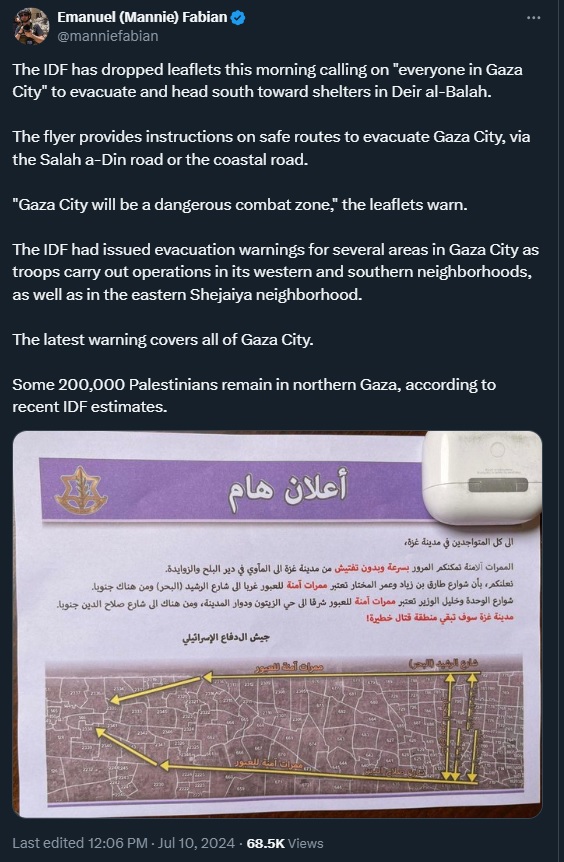
On the morning of July 8th, the IDF announced that it had begun operations during the night in Gaza City, including at the UNRWA headquarters.
“The Israel Defense Forces launched a new operation early Monday morning in southern neighborhoods of Gaza City, following what it said was intelligence of Hamas and Palestinian Islamic Jihad infrastructure and terror operatives in the area. […]
In a statement on Monday morning, the military said it was also operating at UNRWA’s headquarters, located near the Rimal neighborhood, where the IDF previously found significant Hamas tunnel infrastructure and killed and captured numerous gunmen.
The IDF said it had intelligence of new Hamas and Islamic Jihad activity and infrastructure in Gaza City, including weapon caches and detention and interrogation rooms used by the terror groups.”
On July 10th the Times of Israel reported that:
“The IDF in a morning update said troops, including Maglan, had raided UNRWA’s headquarters in Gaza City — located near the Rimal and Tel al-Hawa neighborhoods — which the military said had been used by Hamas and Palestinian Islamic Jihad to carry out attacks against troops. […]
During the raid against the UN site, troops killed and detained several gunmen and located a large amount of weapons, according to the IDF.”
On July 12th the Times of Israel reported that:
“In the latest operation, the IDF said the commandos captured Hamas operatives who attempted to flee the UNRWA headquarters.
The commandos also battled with cells of gunmen who were holed up inside the facility, the army said.
Inside, the army said that Commando Brigade troops found a command room used to observe Israeli forces.
The troops were also said to find parts of a Hamas drone as well as dozens of weapons, including rockets, machine guns, mortars, explosive devices, grenades and bomb-dropping drones.”
On the same day, the Jerusalem Post and other media outlets reported that:
“In other scans of the vicinity, during the army’s ongoing operational activity in the area, soldiers reportedly discovered a subterranean weapons and explosives manufacturing facility inside a university building.”
Remarkably, BBC World Service radio’s Middle East analyst had absolutely nothing to tell listeners about those findings during the “Israeli offensive that’s been going on for a few days” and his claim that “it appears to have stopped” is apparently based on statements from local residents and the Hamas-run civil defence agency referring to specific districts. He did however make sure to amplify the ‘nowhere is safe’ narrative which has been promoted by UNRWA, the BBC itself and others since the start of the conflict.
The item continued with promotion of a blatant falsehood by Reynolds:
Reynolds: “And bringing it back to the United States, of course President Biden in his State of the Union address said the US would build a pier to bring in aid to people in Gaza because getting in aid on the land crossings was difficult because Israel was restricting how much aid could get in there. What’s happened to that pier?”
Biden’s speech took place on March 7th 2024. As noted by UKLFI, both the Rafah and Kerem Shalom crossings were operational at that time.
“The Rafah crossing between Egypt and the Gaza Strip was closed by Egypt between 9 and 20 October 2023. It was reopened on 21 October 2023 and remained open until 6 May 2024, but was closed again by Egypt on 7 May 2024 when Israel took control of the Gaza Strip side.
When the Rafah crossing was open on the Egyptian side, supplies were cleared by Israel at Nitzana (a crossing between Israel and Egypt) and then taken to the Egyptian side of the Rafah crossing for transfer into the Gaza Strip.
According to the manifest, supplies were cleared at Nitzana for transfer to the Rafah crossing on each of the 200 days between 21 October and 6 May except most Saturdays and 12 other days.
The Kerem Shalom crossing between Israel and the Gaza Strip was closed following the attacks on 7 October 2023, but was reopened on 12 December 2023, initially as an additional location for inspection of supplies to be transferred to the Rafah crossing, and then on 17 December 2023 for direct transfers from Israel into the Gaza Strip.
The Kerem Shalom terminal was also used to inspect supplies transferred from Israel into the Gaza Strip via an additional entry point called “Gate 96”.
Supplies were cleared at Kerem Shalom for transfer into the Gaza Strip on each of the 167 days between 17 December 2023 and 31 May 2024 except Saturdays and 19 other days.”
Gate 96 was opened in March 2024 and on May 1st – following extensive construction work which was not reported by the BBC – the formerly pedestrian Erez crossing was opened for the transport of aid. On May 12th, a new crossing – Erez West – was opened in the north of the Gaza Strip. Despite those efforts by Israel to increase the number of crossings, Reynolds nevertheless chose to promote the false narrative that “Israel was restricting” humanitarian aid.
Thomson – who is clearly underinformed on the topic of summer weather in the eastern Mediterranean – then promoted a falsehood which has been seen in previous BBC content:
Thomson: “Well it’s a bit of a sorry story here, James, because we have a floating pier that cost something like $230 million to build…ehm…and it’s had constant problems. It’s had…three times it’s had to be refitted because of bad weather conditions and most recently, on Wednesday this week, there were attempts to re-anchor it because it had been damaged by the weather – by storms – and that has failed. So it looks as if it hasn’t got much longer to go. And if we think, all this time this enormously expensive pier, this problematic pier, has only apparently been able to bring onshore the amount of aid that would have come – pre-war – in just one day: 500 trucks worth. So that again is a very big shame.”
Back in March a BBC News website backgrounder promoted a graphic which similarly told audiences that prior to October 7th 2023, food aid had been entering the Gaza Strip at the rate of 500 trucks a day.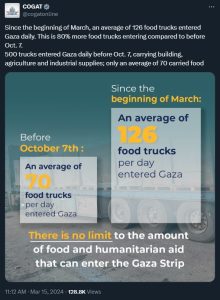
In fact, as clarified by COGAT (and supported by UN data) on average, only 70 of the 500 trucks a day which entered the Gaza Strip before the current war were carrying food. The rest were transporting building, agricultural and industrial supplies.
According to COGAT’s records, the number of trucks to have entered the Gaza Strip via the US pier known as JLOTS is 471. Thomson’s estimate of the cost of the project is lower than that given by other sources.
The item continued:
Reynolds: “And looking at that, President Biden said the reason that pier was needed was to bring in aid much more quickly so if the pier didn’t work, how has aid been getting in?”
Thomson: “Well it did work…it helped a little, definitely. I mean to be fair, it did help a bit. But one of the other problems was – once it got ashore – it was getting it from the warehouse there on the dock, getting it then to the people who need it. And because of ongoing unrest, trucks being hijacked and of course the firing – Israeli strikes continuing – that meant it was very dangerous and very difficult to distribute.”
Notably, as in previous BBC reporting Thomson avoided the topic of threats and attacks on the pier by terrorist groups in the Gaza Strip and downplayed the issue of the theft of aid entering by that route while promoting claims of “Israeli strikes”.
Reynolds continued:
Reynolds: “As we were on air on Thursday, I was watching lots of messages come in on the screen about potential difficulties – further difficulties I should say – in negotiating any kind of truce or ceasefire agreement. Where do those difficulties stand?”
Failing to provide listeners with information which would enable their understanding of his reference to “smuggling of arms”, Thomson replied:
Thomson: “Well the latest word appears to be that…ehm…Prime Minister Benyamin [sic] Netanyahu has said that he doesn’t want…he won’t allow Israeli forces to leave Israel’s – sorry – Egypt’s border with Gaza. He said that’s vital to stop smuggling of arms by Hamas and yet one of the key demands – the key ceasefire demands – of Hamas is that all Israeli forces leave Gaza. So there’s a big trip-up point. And also of course Egypt is not at all happy – going back to aid – it doesn’t want Israeli troops on the Gazan side of the…of its border. And that’s why it stops aid deliveries passing through there. And if you go back to when it was in its full flow, this was providing by far – the Rafah crossing point – was providing by far the biggest amount of aid coming into Gaza.”
As has generally been the case in BBC reporting, Thomson and Reynolds were clearly far less interested in Egypt’s decision in early May to prevent aid from entering the Gaza Strip via the Rafah crossing than in promoting a narrative whereby Israel was “restricting” aid. Thompson refrained from informing listeners that since late May, aid trucks have been redirected from the Rafah crossing to the Kerem Shalom crossing, where rocket attacks by Hamas continue to be mostly ignored by the BBC.
As we see, BBC audiences worldwide were given no information about the purpose of the recent IDF operations in Gaza City or the exploitation of civilian infrastructure in that location by terrorist organisations. As has been the case in far too much BBC reporting, this four-minute item – which is still available online – promoted specific framing on the topic of humanitarian aid which downplayed any factors not related to Israel and even promoted false information.
Related Articles:
BBC GRAPHIC MISLEADS ON HUMANITARIAN AID CROSSING
BBC BACKGROUNDER MISLEADS ON HUMANITARIAN AID TO GAZA STRIP
AN OVERVIEW OF BBC NEWS WEBSITE PROMOTION OF AN IPC REPORT
BBC NEWS ERASES TERRORIST THREATS FROM REPORT ABOUT US AID PIER
BBC NEWS FAILS TO INFORM ON TUNNELS IT REPORTED 4 MONTHS AGO
INACCURATE GRAPHIC, FAILURE TO MEET EDITORIAL GUIDELINES IN BBC RAFAH REPORT

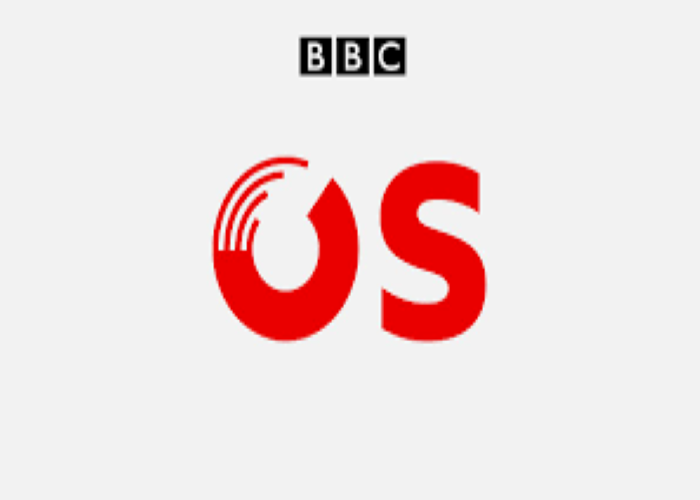
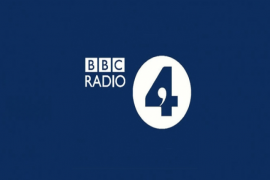
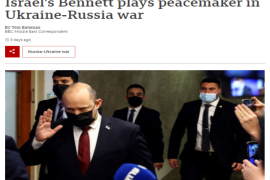
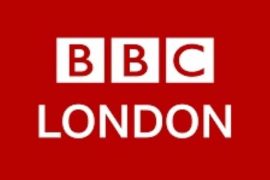

James Reynolds – a BBC Star journalist for the last 23 years has when reporting events in the region of Israel has always taken a partial biased view against Israel, much like his father Paul.
https://en.wikipedia.org/wiki/James_Reynolds_(journalist)
A thoroughly nasty piece of work! S typical of the BBC
It’s not what is said but what is omitted that leads the listener to adopt a hostile opinion of Israel. It is a well-known propaganda ploy.